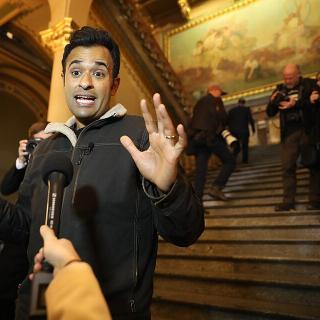Advertisement
Power players in the Franklin County Democratic Party think you’re stupid. At least the propaganda campaign they’re running around the FCDP Central Committee race makes it look that way.
In 2016 a number of progressive Democrats ran for ward seats on the Central Committee in an attempt to move the party to the left. Fifteen candidates affiliated with the grassroots group Yes We Can got major pushback from the party establishment.
Instead of allowing an open, democratic process — where ward candidates could win seats by listening to the concerns of their neighbors and committing to fight for them — the FCDP Executive Committee gave party chairman William Anthony the authority to hand-pick Central Committee candidates for the sample ballot. This mailing to all Franklin County voters contained only the names of party-endorsed candidates.
For the 2016 election the sample ballot was renamed to the Unity Ticket. By “unity,” I think the FCDP leadership means “conformity.” They don’t want a healthy debate within the party about what its priorities should be. They weren’t content to simply pretend that the progressive candidates didn’t exist. To make the playing field even more uneven, they mailed a flyer that blasted the progressive candidates as “fake.”
In spite of the party’s top-down, undemocratic approach, seven Yes We Can candidates won the uphill battle and managed to get elected to Central Committee, along with a few progressive candidates from other grassroots organizations.
It was an admirable effort, but it wasn’t enough to change the orientation of the party. The FCDP stayed on its center-right trajectory — catering to corporate interests like tax abatements and unfettered gentrification while giving only lip service to the needs of people who live in the poorest of the county’s 152 wards: a living wage, affordable housing, quality public schools, and access to basic services.
Fast-forward to the 2020 Central Committee race. This time, progressive Democrats will be harder for the FCDP establishment to brush aside. They’ve come back in force, submitting petitions to run in 83 wards. This time they are organized under the banner #RepYourBlock2020, adapting the name of a similar effort in Brooklyn, NY.
After #RepYourBlock2020 began to organize last year, the FCDP countered by launching its own campaign in November: Franklin County Democrats United (FDCU). They created a web site and a Facebook page.
FDCU is a classic case of astroturfing, which John Spacey of simplicable.com describes as “the creation of a fake grassroots organization to pretend there is there is popular support for the agenda of an industry, firm, or political elite…. An astroturfed organization may have few actual members and simply act as a front for lobbying, political donations, promotion and advertising.”
FDCU’s donation web page asks for contributions from $100 to $5,000. “United” in the group’s name hearkens back to the Unity Ticket of 2016. You can bet that this money will be used to promote only party-endorsed candidates.
When Columbus Underground ran a story about #RepYourBlock2020 in January, Columbus Mayor Andrew Ginther’s chief policy advisor Bryan Clark posted an ill-advised Facebook rant against the group. It was a clumsy attempt to discredit the candidates by accusing them of things that are not demonstrably true, and other things that would not be nefarious even if they are true (for example, that they have the support of Morgan Harper and Bernie Sanders). Clark quietly removed the Facebook post after Scott Woods effectively debunked his claims and rhetoric in a Columbus Alive article.
Since then, Clark has toned down his social media presence a little, confining himself mostly to reposting propaganda from FCDU’s Facebook page, such as a January 21 post which reads in part: “The bipartisan Franklin County Board of Elections voted today to reject attempts by RepYourBlock2020 to stack the primary ballot in their favor. RepYourBlock2020 filed the only protests against Democratic central committee candidates, attempting to kick seven Democrats — primarily women and people of color — off the ballot. They also told the board to ignore Ohio law and put six of their candidates on the ballot.”
There’s a lot to unpack here. The spurious appeal to identity politics is hardly worth mentioning; surely the anonymous staffer who wrote the post is aware that women and people of color are well-represented in Rep Your Block.
More insidious is the fact that the post leaves out important context and reverses the order of events. The Board of Elections rejected the six Rep Your Block candidates first. On December 16 and 17, right before the filing deadline, Rep Your Block volunteers brought a few candidate petitions to the Board of Elections to see if they would be accepted. They had some slight irregularities. For example, the bottom of some sheets was cut off, so the petitions were not completely full of signatures. “We asked if they were OK,” said Rep Your Block organizer Bryce Sampson. “Can we turn this one in, or do we need to go out and gather another petition?” Two Board of Elections staffers told the volunteers that the petitions were all right — the Board had accepted petitions like that in the past.
Michael Sexton, current chairman of the FCDP, is also one of the two Democrats on the Franklin County Board of Elections. He took a very different view when he saw the irregular petitions. He voted to throw them out. The two Republicans on the Board voted the same way. Kimberly Marinello, the other Democrat on the Board, abstained from voting to prevent a conflict of interest. Marinello is running for Central Committee, and one of the candidates the Board was rejecting would have been her opponent in Ward 49.
As FCDP chair William Anthony did in 2016, current chair Michael Sexton unilaterally endorsed Central Committee candidates for the sample ballot.
It’s in the context of this debacle that Rep Your Block volunteers later examined party-endorsed Central Committee candidate petitions, found irregularities, and filed to have them thrown out. Turnabout should be fair play, but the Board disagreed.
“All thirteen RepYourBlock2020 legal filings were rejected,” crows the anonymous staffer on the FCDU Facebook page. “The bipartisan board voted unanimously to make sure everyone plays by the same rules and has a fair chance to run in the Democratic primary.” The irony is excruciating.
The lesson here is not simply “don’t believe everything you read.” That’s part of it, but the larger lesson is that the Democratic Party establishment needs to be called to account for subverting the democratic process. A good way to do that is to hit them where it hurts the most: at the ballot box.
Franklin County voters will elect candidates to the FCDP Central Committee on March 17. A list of all ward candidates — endorsed and unendorsed — is available on the Franklin County Board of Elections web site. The site also has ward maps, in case you don’t know which ward you live in.
If the Central Committee seat in your ward is contested, try to contact both candidates and listen to what they have to say. Chances are, the candidate who’s not endorsed by the FCDP will have a plan to fight for the changes your neighborhood needs.
Anna Siriano, Ward 57 in the Hilltop
Anna Siriano grew up in Hilliard, went to Ohio State University, and lived in Grandview and Upper Arlington after that. In 2016 she moved to the Highland West neighborhood in the Hilltop.
“When I moved to the Hilltop, coming from the suburbs, the conditions of the neighborhood were something I’d never experienced before,” Siriano said. “Obviously I was aware that poverty exists — that people are going through issues every day just to get by. But I’d never lived in an area where there were open manholes when you walk down the street, where sidewalks and roads were cracked, where there was waste everywhere, and a lot of other conditions that were shocking to me.”
Siriano went to area commission meetings and participated in the Hilltop Community Plan. “What I’ve learned from participating at the civic level is that everyday residents are often tasked with tackling the biggest issues that we’re facing every day in our neighborhood. Often we’re told there’s not funding, or that we have to wait for certain things to happen.” As she put a great number of volunteer hours into civic engagement, Siriano learned from people who had lived in the neighborhood for more than 20 years that city officials had repeatedly made — and failed to keep — promises to improve conditions in the Hilltop.
“Once I knew what Central Committee was, what I saw in Rep Your Block was a way to push the party that I identify with — the Democratic Party — to really live out what it stands for: people creating a country that works for all people, and allows them to thrive. Around me, I’m seeing my neighbors not thriving, not feeling safe, not having access to the amenities that other neighborhoods have.”
Being a Central Committee representative would give Siriano a direct channel to confront policymakers at the local or state level who come to the FCDP asking for an endorsement, she said. “I could ask them: ‘What are you doing to address these issues that I see in my neighborhood? I haven’t seen you around.’
“I want to be able to call them to account when promised change doesn’t happen,” Siriano said. “I want to be able to ask tough questions, and use the endorsement process as a tool for people to demand the things that they and their neighbors need.”



